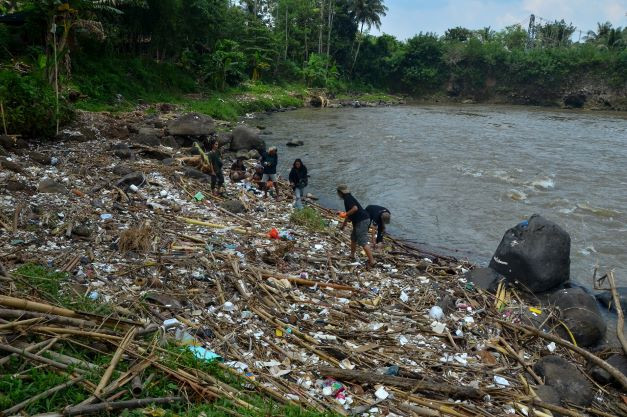To invest with impact, invest in the planet
By 2050, global demand for resources will almost triple to 130 billion tons annually, which would overuse the Earth's capacity by over four-fold.
Change Size
 Saving the river: Activists grouped under the Ecological Observation and Wetland Conservation (Ecoton) collect plastic waste that pollutes the Ciwulan River in the Leuwi Bilik area in Tasikmalaya, West Java, on April 2. (Antara/Adeng Bustomi)
Saving the river: Activists grouped under the Ecological Observation and Wetland Conservation (Ecoton) collect plastic waste that pollutes the Ciwulan River in the Leuwi Bilik area in Tasikmalaya, West Java, on April 2. (Antara/Adeng Bustomi)
T
he ongoing climate emergency still prevails us, and climate change can no longer be dismissed as a remote threat. In the recent report from the United Nations’ Intergovernmental Panel on Climate Change (IPCC), the world’s leading climate scientists have made it clear that minor, reactive or incremental changes are no longer sufficient to tackle the climate emergency.
In addition, Kaveh Zahedi, deputy executive secretary at UN Economic and Social Commission for Asia and the Pacific (ESCAP), recently noted that Asia Pacific is not on track to achieving any of its sustainability targets by 2030, citing the pandemic having an impact on progress in many areas.
Closer to home, Indonesia is not insulated from the impact of climate change. Rising sea levels from global warming has caused several parts of Indonesia to be highly susceptible to flooding – the capital city Jakarta is now the fastest sinking city in the world, sinking as fast as 10 centimeters per year.
In light of this critical situation, this year’s Earth Day theme is “Invest in Our Planet,” which focuses on the importance of taking action, and how individuals and organizations can make a difference.
As we emerge in recovery from the pandemic, investment flows have already demonstrated an upward trajectory. The Organization for Economic Cooperation and Development data shows that global investments in the first half of 2021 reached US$870 billion, exceeding pre-pandemic levels by 43 percent and more than double those of the second half of 2020.
But how much of it is going into driving positive environmental and social impacts? Given that our future hinges on our efforts to reduce the effects of climate change, sustain our limited natural resources, as well as coping with the demands of a rapidly growing global population, is investing in the planet not the best option for the future?
A green future is a prosperous future, and this is why governments, industry, and individuals need to work together to achieve sustainable solutions for climate change and pollution. As we reflect on this year’s Earth Day, companies of all sizes need to take action and embrace the benefits of a green economy, and for business leaders to get on board with a sustainable future approach.
One of the most crucial areas to address is tackling our energy and water efficiencies, both of which are core to the functioning of industries, municipalities, and buildings. In our increasingly industrialized and populated world, our water and energy usage continue to skyrocket amidst our limited resources.
Not only that, with fossil fuels being the source of most of the energy produced today, water processes are indirectly responsible for producing large amounts of greenhouse gases, consequently contributing to climate change.
While Indonesia has taken important steps toward resource efficiency as part of its broader sustainability efforts, one of the ways businesses can reduce their energy and water consumption is by implementing intelligent, resource-efficient technologies.
With energy, businesses can look to utilize smart technology that regulates supply with demand. Notably, conventional cooling in buildings can be energy intensive, given the need to move large amounts of water constantly. Intelligent technology today can now intuitively adjust chilled water flow to meet changing cooling demands, ensuring efficient energy use without compromising performance.
Meanwhile, water efficiency can be achieved through improving infrastructure to reduce water loss during the distribution process. A World Bank study puts the global estimate of physical water losses at 32 billion cubic meters each year.
Going beyond resource efficiency, companies also need to look at embedding circular principles throughout their business. Circularity focuses on designing waste out of the resource ecosystem and maximizing the value of resources by keeping them in use for as long as possible. Currently, the global supply chain is still driven by the linear economy, where raw materials are processed, used, and then discarded as waste.
However, a linear approach is not sustainable in the long run. If we continue on this path, by 2050, global demand for resources will almost triple to 130 billion tons annually, which would overuse the Earth's capacity by over four-fold. Meanwhile, a circular economy greatly reduces our impact on the environment, with experts noting that its potential of reducing 40 percent of global carbon emissions.
Indonesia is well underway with adopting a circular economy approach across the value chain. Notably, Coordinating Economics Minister Airlangga Hartarto affirmed the government’s commitment to transform Indonesia's economy into a circular one to better conserve the nation’s natural resources.
To implement circularity comprehensively, it is important that manufacturers ensure it has a place every step of the lifecycle, as they have a hand in everything from sourcing raw materials down to delivering the final product.
Water reuse is also a big part of circularity – by ensuring wastewater is effectively treated to a quality that makes it possible to feed back into our water cycles, it allows water to be saved in a time of scarcity. Water treatment solutions now are capable of empowering companies to reuse their wastewater, reduce costs, and do their part to ensure that our natural water sources are not unnecessarily exploited.
Last but not least, it is important to invest toward innovation and partnerships that can help people in poor areas and remote communities have better access to clean water. Key sectors like agriculture, industry, and services, rely heavily on water, which means improved water access and management can contribute substantially to economic growth.
Investing in water access reaps tremendous economic benefits. Every dollar invested in water access and sanitation yields an average $6.80 in returns, according to the Copenhagen Consensus Centre. The World Bank found that failing to implement better water management policies could result in regional GDP losses from 2-10 per cent by 2050.
In Indonesia, about 18 million Indonesians lack safe water and 20 million lack access to improved sanitation facilities. PAMISMAS, Indonesia’s National Rural Water Supply and Sanitation Project, has helped low-income rural and peri-urban population in the country access improved water supply and sanitation facilities.
While a timely reminder, we need to recognize that climate action is not something we just consider on Earth Day; climate action is a year-round effort. It is crucial that we collectively work together to effectively tackle climate change. To create meaningful and effective change, all of us – from governments to businesses to individuals – have a role to play.
***
The writer is senior director, group sustainability, Grundfos.









